Budge Pountney: English exile who preferred life as a Scot
- Published
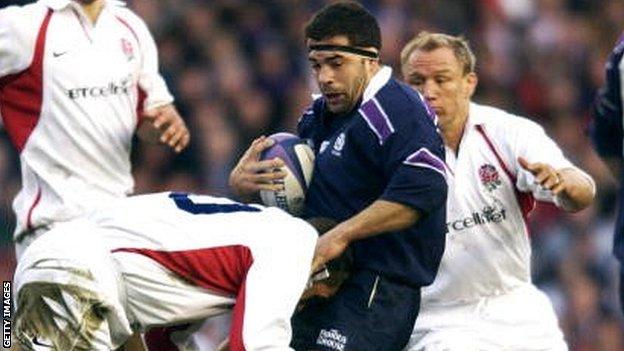
Pountney came through England's age-group squads before switching allegiance to Scotland
For the Scot in exile south of the border during the Six Nations, a flak jacket and skin thicker than a rhino's are mandatory attire.
Camaraderie, banter, joshing - dearly held rugby tenets - are likely to have yielded a volley of verbal shrapnel for the likes of Bath's Dave Denton, Saracens' Duncan Taylor and Wasps' Ruaridh Jackson in the countdown to Saturday's Calcutta Cup clash.
Scotland's recent record in the fixture provide England club-mates with plenty of ammunition. No wins in the past eight meetings, one out of the past 10, three wins in 27 since the infamous 1990 Grand Slam game.
The Scots' overall Six Nations record adds further grist to the mill. Four Wooden Spoons. No titles. One win in their last 12 Championship matches. Defeats in their last seven.
It was familiar terrain for Budge Pountney, the hard-nosed flanker who spent his entire club career with Northampton Saints, a domestic haven for Scotland internationals in the late 1990s and early 2000s.
After Scotland won the last Five Nations Championship in 1999, the champions opened the defence of their title with an unceremonious beating by tournament new-boys Italy in Rome.
"When we got back to Northampton, the England lads whistled 'The Italian Job' theme tune for the whole week," Pountney recalls.
'A 6ft 10in man trying to hide in an airport'
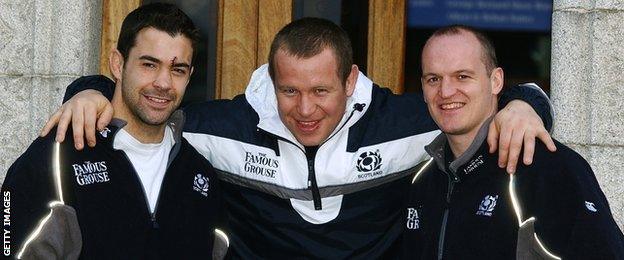
Pountney, Mattie Stewart and Gregor Townsend were part of the Scottish contingent at Northampton
Further losses to Ireland, France and Wales followed. A chastening whitewash beckoned, with Grand Slam-chasing England visiting Murrayfield on the final weekend.
"[Ex-England and Northampton lock] Martin Bayfield offered [Scotland prop] Mattie Stewart and I a lift back to Northampton after the Wales game in Cardiff," says Pountney.
"We turned up with our bags and he pretended he couldn't lift them. He was saying, 'You've got too many Wooden Spoons in there, boys. I can't pick them up'."
But Pountney and his fellow Saints exiles - there were half-a-dozen that year with Gregor Townsend, Craig Moir, Steve Brotherstone, Richard Metcalfe and Stewart also at Franklin's Gardens - would have their revenge.
Nicol recalls historic Calcutta Cup win
Ravaged by the cold, drenched by a Murrayfield deluge, tactically naïve in the face of an all-out Scottish assault, England's Slam hopes bit the dust as Duncan Hodge's 19 points secured a famous victory.
"We were told we had to be back at Northampton the day after," Pountney says. "The England boys were given a day off because they'd organised a Grand Slam party.
"The first person we saw at the airport was 'Bayfs' [Bayfield] and we absolutely panned him. We were hounding him down the departure lounge. A 6ft 10in man was trying to hide in an airport.
"The England boys didn't turn up at Northampton the next day, or the Monday after. When they did, we gave them some amount of grief."
'It made much more sense to play for Scotland'
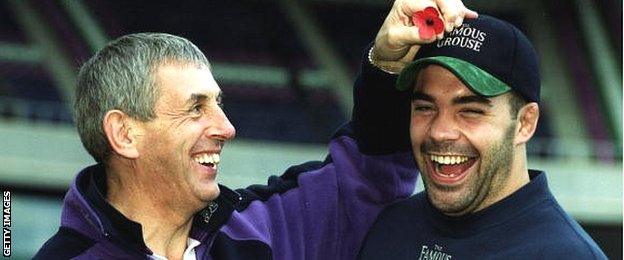
Sir Ian McGeechan knew Pountney well from his time as Northampton director of rugby
Scotland's unexpected triumph had even greater resonance for Southampton-born Pountney - an Englishman who felt more at home as a Scot, in rugby terms at least.
His route to Scotland honours was geographically tenuous even by today's cosmopolitan standards; a grandmother from the Channel Islands rendered him eligible for any of the home nations.
Yet, despite representing England Students and Under-21s, he never felt comfortable in the English set-up and was pointedly told that - even at 6ft - he was too short for a senior back-row berth.
So when Sir Ian McGeechan, the Scotland coach who spent five years in charge at Saints before returning to the national set-up, drew Pountney's attention north, he had an interested customer.
"I loved the passion, I loved the energy; I'm all about that," Pountney says. "That's how I played.
"It made much more sense, bizarrely, than playing for England, even though I was brought up in England all my life.
"Scotland gave me something I fitted into a whole lot more and something I was very passionate about. I hope that showed in the way I played."
'Quitting Scotland left a huge hole in my life'
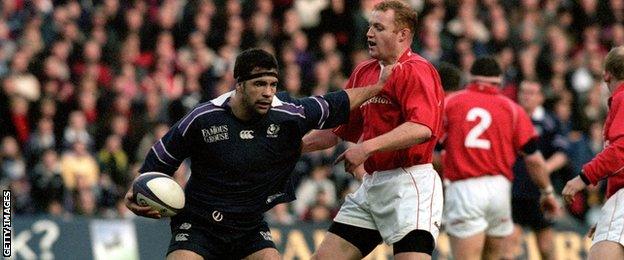
Pountney won 31 caps between 1998 and 2002 and played in Scotland's Five Nations triumph in 1999
Tagging calves on the farm his father managed honed the young Pountney's tackling prowess and taught him the value of hard graft.
But, while he and his Scotland team-mates toiled on the training paddock with the 2003 Six Nations looming and the World Cup to follow later that year, Pountney grew sickened by the unrelenting sloppiness and "unprofessionalism" that met them off it.
No water at training. Soup and a ham roll rather than recovery drinks. On one occasion, after giving his match-day tie to an adoring young fan after a defeat by New Zealand, he was promptly billed for a replacement.
Pountney, who had suffered a gruesome recent injury that resulted in him losing a testicle, saw all this in stinging contrast to the lavish affairs of Scottish Rugby's "blazered brigade".
His resentment festered until he decided drastic action was needed. At just 29, he walked out of a national training session at Murrayfield, never to play international rugby again.
"It was the only thing I could think of that was going to have an immediate effect, start people talking and questioning things," he said. "Maybe further down the line, it would get better for everybody else.
"Playing for Scotland was the best thing I've ever done in rugby. Leaving left a huge hole in my playing character, my playing life, but it was something I felt was so right, I had to do.
"Some people said, 'Oh, you'll live to regret that'. I don't."
Poacher-turned-gamekeeper
Pountney is still involved in rugby, though, a poacher-turned-gamekeeper. After living on the edge as a player, he now works for the Rugby Football union as a citing officer, striving to avoid "sanitising" the sport that has been so pivotal in his life.
Scotland may not have pulled up any trees in the Six Nations in recent years, but ahead of this year's Calcutta Cup encounter, Pountney is enthused by the free-spirited rugby the current side have been playing under head coach Vern Cotter.
"That style is so much more fun than sticking it up the jumper," he adds. "It's the hardest style to play, but it looks like the boys are loving it, like they're totally into it."
If it stops Eddie Jones' new England chariot in its tracks at Murrayfield on Saturday, a few Scottish exiles will have something to say about it.
- Published30 January 2016
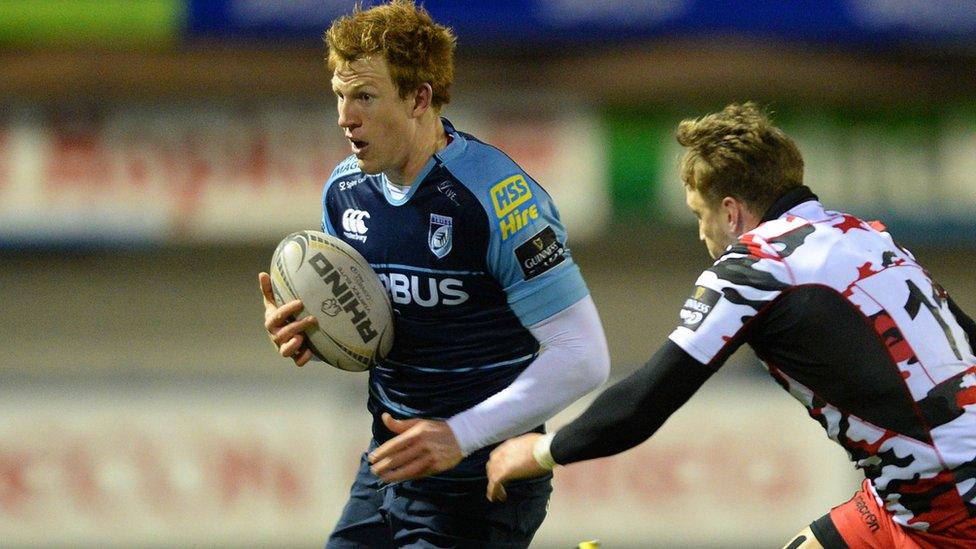
- Published29 January 2016
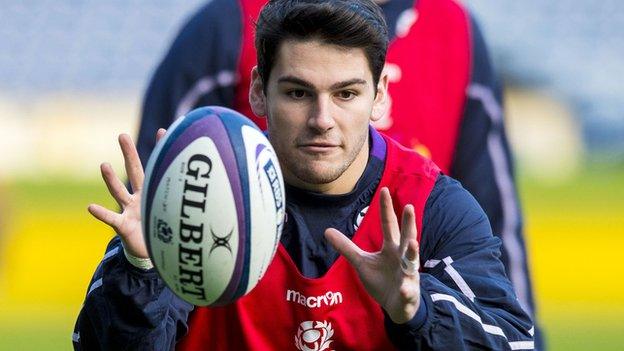
- Published14 September 2016
